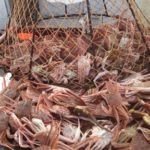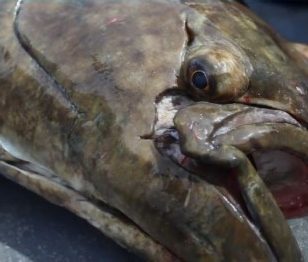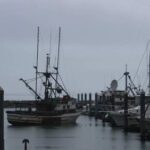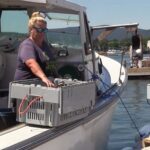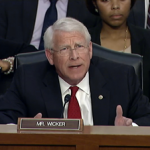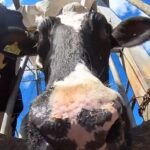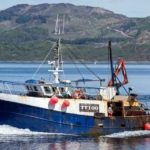Tag Archives: Coronavirus
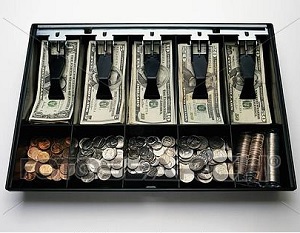
Alaska: Reopening of state economy begins
Restaurants, shops and hair salons around Alaska are beginning a cautious reopening under strict state mandates as Alaska works to inhibit the spread of COVID-19, while the economic reopening remains on hold in Cordova. Emergency order 2020-05, issued by City Manager Helen Howarth, reinstates business restrictions lifted by the state on April 24 until May 20. Independent commercial fishermen meanwhile now have their COVID-19 marching orders from state officials, a list of protective measures, procedures, travel and access measures they must abide by, as the influx of seafood workers begins in Cordova. >click to read< 10:25
Strict new pandemic rules are in place for Alaska fishermen and their vessels – >click to read<
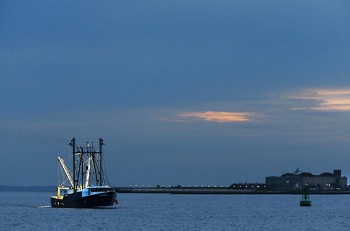
Coronavirus: Seafood prices have dropped, but New Bedford fishermen still fish amid pandemic
“We’re still going out, everything’s running right along for us,” groundfisherman Antonio Cravo and co-owner of F/V United States said on Monday. Cravo, who is based in New Bedford, said the prices have dropped and he’s getting less money for the fish he catches, but it’s still worth going out on trips. “We offloaded last night and just got paid today, the prices dropped, but it’s still worth it to keep going,” Cravo said,“We still get a paycheck, not as much, but we still get a paycheck to keep up with our bills.” The price of scallops is also holding steady, according to scalloper Eric Hansen. “I wouldn’t say [the prices] are great, but they’re steady,” Hansen said. >click to read< 07:25
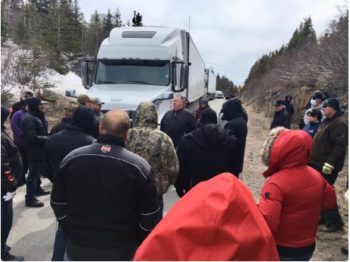
Crab trucks roll toward Triton after confrontation in South Brook – Crab fishery delayed until at least May 11
By noon on Tuesday, the trucks began to roll toward the fish plant, but were being slowed by protesters. RCMP were on hand ticketing the drivers who were interfering with their progress. >click to read< 16:56
Crab fishery delayed until at least May 11, following days of protests – After two days of protests by fish harvesters, the snow crab fishery in Newfoundland and Labrador has been delayed until at least May 11. DFO issued a media release at 5 p.m. Tuesday saying the exact start of the season has not yet been determined. That delay comes after several days of protests in several different locations in the province. The protests started late Sunday in Port aux Basques when the Fish, Food & Allied Workers union, which represents fish harvesters, learned snow crab was being brought in from outside the province to be processed. Late Tuesday afternoon, two transport trucks were able to offload crab,, >click to read< 17:03
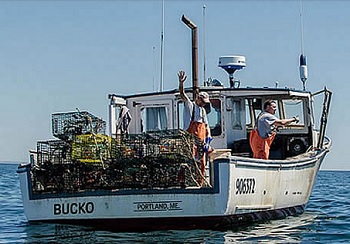
Maine Department of Labor to Accept Unemployment Applications from Self Employed and Others 8 a.m. May 1
The Maine Department of Labor will begin accepting applications for the new Pandemic Unemployment Assistance (PUA) at 8 a.m. Friday, May 1. People whose claim does not require further review should begin receiving benefits within seven days of filing. Pandemic Unemployment Assistance is a new federal program which expanded eligibility for unemployment benefits to certain categories of workers not typically able to receive unemployment in the past, such as: ,Self-employed workers ,Farmers/Fishermen, Independent contractors, Nonprofit employees not already covered by regular state unemployment benefits, Gig economy workers, Workers who do not have enough work history and earnings to be eligible for traditional unemployment benefits, Others who have been determined ineligible for regular unemployment benefits. >click for links, and more information< 14:10

What’s that? Alaska fishing boats to fly quarantine flag
The “Lima flag” is not something most of them have probably ever seen in person. And the requirement is only if they or their crew members are coming from out of state. If they have a crew member who needs to self-quarantine on board for any reason, that yellow and black flag (or maybe a Pittsburgh Steeler’s sweatshirt, if no quarantine flag is to be found) has to go up the mast to warn people to stay away for 14 days. The details of how independent fishing vessels will have to protect coastal communities from incoming coronavirus contamination are laid out in Health Mandate 17,,, >click to read< 08:50
Commercial fishing vessels get COVID-19 mandates – Independent commercial fishermen got their COVID-19 marching orders from state officials Thursday, April 23, a list of protective measures, procedures, travel and access measures they must abide to protect themselves and coastal communities. >click to read< 10:48
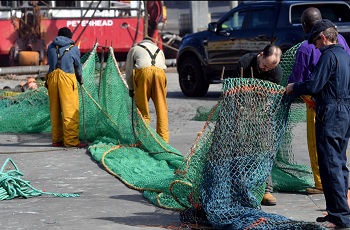
The Silent War on Fishing
The hustle and bustle of Peterhead’s harbour has quietened these last few weeks. Doors of businesses are locked and boats at berth have signs warning that no one will be permitted on board because of new safety measures. Its fish market continues to operate, however, in what is becoming a new normal. While it once welcomed tourists and eager locals alike, it now restricts access to only key workers in order to protect stakeholders. It’s a familiar story across all ports in Scotland. They are steps that have been introduced to help the country battle COVID-19, but it has had an inevitable impact on the market. >click to read< 08:07
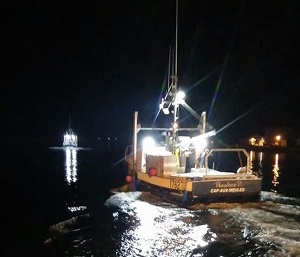
OCI granted injunction as fishermen block out-of-province crab
The Supreme Court of Newfoundland and Labrador has granted Ocean Choice International an injunction ending the Fish, Food & Allied Workers union’s blockade on the highway near South Brook. The injunction prohibits FFAW members from blocking the route to OCI’s processing plant in Triton or interfering with customers or contractors entering the property. It’s the latest development in an argument between the union and Association of Seafood Producers over whether the fishery should be up and running during the COVID-19 pandemic. Union members blocked two fishing vessels from the Magdalen Islands from offloading crab in Port aux Basques on Sunday evening. >click to read< Protesters Who Blocked Out-of-Province Crab Shipment Facing Court Injunction, tweets, >click to read< 18:04
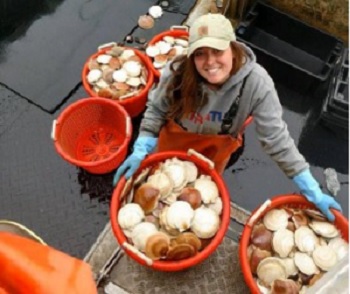
For NH’s food producers, Coronavirus sends a very mixed message
Across New Hampshire, the demand for local food is up, even as restaurants have closed or have tried to get by with takeout. The state’s small farmers are finding an unexpected benefit in the Covid-19 pandemic – there is an increased demand for their locally grown meats, vegetables, dairy, and other products.,, And for the Vernons and others, business is thriving. Demand for fish Kayla Cox, manager of New England Fishmongers, said the company’s business model for the past couple of years has been to sell directly to consumers – no wholesale. “What has changed drastically is that home delivery has completely blown up. It’s almost out of control,” Cox said. “We were doing 15 to 20 deliveries a week, and this past week we did 170. >click to read< 13:04
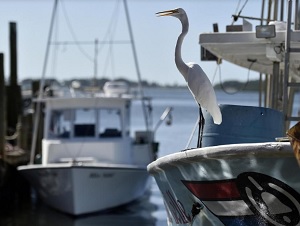
Coronavirus Florida: Cortez fish company staying afloat
Fishing boats are still leaving the docks in Cortez, but coronavirus has changed the specifics of where the hauls wind up. Karen Bell, president of A.P. Bell Fish Co., said “we’re holding our own” when asked about the impact the virus has had on the fish house she owns in the historic village of Cortez that sends seafood all over the world. Business is far from brisk, but demand is still there, even if the target has been altered. “It (the virus) shifted everything around,” Bell said. “People are still eating but they’ve changed how and where they eat.” Of the fish being unloaded now, 60% are coming from inshore, 40% offshore, Bell said. Before the virus upended the economy, it was the other way around. >click to read< 10:20
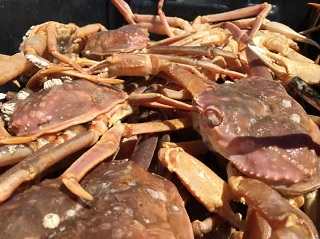
Coronavirus: Fishermen block out-of-province crab shipments heading for N.L. fish plants
It’s the latest development in an argument with the Association for Seafood Producers over whether or not the fishery should be up and running during the COVID-19 pandemic. The Fish, Food and Allied Workers union (FFAW) says its members do not want to go to work on boats or in plants until their safety is assured. “Fish harvesters are mobilizing around the province to block out-of-province crab from landing in Newfoundland and Labrador for processing,” said a statement sent by the FFAW on Sunday night. “Harvesters and plant workers are calling on the provincial government to step in and for companies to respect N.L. workers.” >click to read< 07:40
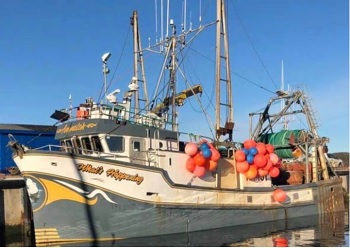
As crab season gets closer, Labrador harvesters worry about their health amid Coronavirus pandemic
Crab fisherman Joey Angnatok has been fishing since the mid-’90s and he’s worried not only for his health but also his crew members’ health. “Let’s just say an observer was on board your boat last week, and then he comes on my boat and we find out that one of your crew members had the sickness,” said Angnatok. “There’s so much uncertainty you drive yourself crazy trying to think about all the possibilities.” Last weekend, the provincial Fish Harvesting Safety Association released 12 control measures to help prevent the spread of COVID-19 while fishing. >click to read< 10:02

Coronavirus: Seafood association president lauds relief funding – Snow crab fishers, processors adjust to restrictions
The president of the Nova Scotia Seafood Alliance is lauding a funding announcement to help Canada’s fish and seafood sector amid the COVID-19 pandemic, despite not knowing many specifics. “The devil’s in the details, which we haven’t seen yet,” he said. Saturday’s funding announcement only applies to processors, but Jordan referred to it as a “first step.” >click to read< 08:47
Northern Cape Breton snow crab fishers, processors adjust to COVID-19 restrictions – Snow crab fishers and processors in northern Cape Breton are taking steps to carry out their work safely during the COVID-19 pandemic. Dave Donovan is a snow crab fisherman who hails from New Haven, N.S. “The co-op would normally unload our boats. That has changed this year,” Donovan said. “They don’t want us to intermingle with the workers. We don’t want that either.” >click to read<
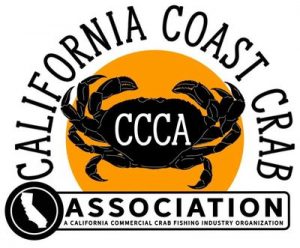
Dungeness Crab Season Closed Early Due to Dubious Whale Crisis, COVID-19 Economic Impact on Coastal Communities Made Worse by Closure
The California Department of Fish and Wildlife (CDFW) today announced that effective May 15, 2020, the commercial Dungeness crab fishing season, which began in December, will be closed due to the perceived risk of commercial crab fishing gear harming migratory whales. Ironically, as a result of ongoing cooperative measures between the California Dungeness crab fishing fleet and CDFW, interactions between Dungeness crab fishing gear and the two subgroups of Humpback whales, or Distinct Population Segments (DPS), which are “endangered” and “threatened” under the Endangered Species Act (ESA) are extremely rare. “The risk of crab fishing gear harming endangered whales is statistically insignificant because of low concentrations of whale, as well as the relatively small amounts of gear being deployed along the Central California coast,” said Ben Platt, president of the California Coast Crab Association (CCCA). >click to read< 12:26

Coronavirus: Some P.E.I. fishermen dismayed by delay to season, others relieved with May 15 start date
At a time when Ottawa is spending billions to help people make ends meet, some Island fishermen are taking a different tack. They want permission to fend for themselves and go fishing. “We just want to try to make enough money to get by. That’s all we want to do,” said Tignish fisherman Kenneth LeClair.,, Other fishermen, though, are relieved by the two-week delay. “The majority of people are relatively pleased,” said Gerard Holland, who fishes at North Lake. “Some is not pleased at all and in fairness to them, they need to be heard too, but the biggest concern most of us had was to make sure that everyone had a buyer, so the later we went, the better the chances of the market improving.” >click to read< 08:27
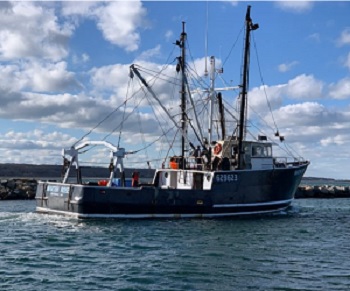
Anchors aweigh for community seafood pilot program
“Although state and local regulations and federal guidelines have designated fishing operations as essential businesses, many large fish buyers have shut down or are offering prices too low for fishermen to recoup operating expenses and pay crews and other employees,” an MVFPT press release states. “Additionally, with restaurants and wholesale markets closed, many fishermen have [fewer] options to offload product. As a result, many commercial fishing boats have been unable to leave the dock. At the same time, widespread unemployment from lockdown orders have left many communities in greater need of food than in a generation. This project aims to help both the fishing businesses and the community food organizations who are assisting people experiencing food insecurity.” The initial participants in the program are Capt. Sam Hopkins of the FV Endurance and Capt. Wes Brighton of the FV Martha Rose. >click to read< 07:37
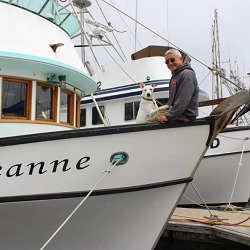
North Coast fishermen worry about pricing when California salmon season opens May 1
All eyes are on whether the retail business will be good enough to sustain the losses in the wholesale market with the restaurants closed amid the coronavirus pandemic. When the season opens, it’s unclear how much fishermen will earn, but some estimates are as low as $3 per pound. While the shelter-in-place closure or limitations has dried up the wholesale market, the retail market has been keeping the industry afloat.,, Whatever is bought, Bodega Bay fisherman Dick Ogg stands prepared to launch his 54-foot boat named Karen Jeanne. “It’s a challenge to say the least. The closure of the restaurants is significant. I don’t think anybody has seen anything like this in history,” he said. “I’m trying to figure out how it’s going to work out. I don’t know how much money we’ll get and how it will get transported.” >click to read< 16:36
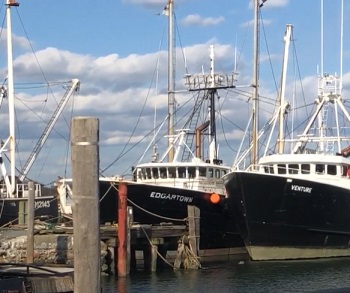
Coronavirus: New Bedford fishermen navigate waves of uncertainty
Danny Eilertsen owns Nordic Inc., a fleet of six scallop boats docked at Fish Island in New Bedford. He said they fish for scallops all year, but the scallop season really begins April 1. Ironically, he said, right now is great at sea — a healthy catch and cold waters. Yet when they come back with tens of thousands of pounds of scallops, they’re selling to a completely different market in the age of coronavirus. “Scallops on the menu at restaurants now are a staple, they’ve been a staple for quite a few years. Pretty much every restaurant you go to has scallops, and that’s just stopped. So the fresh market for us is gone and that’s probably where the value has lost so much this last month, couple of months here,” Eilertsen said. >click to read< 11:49
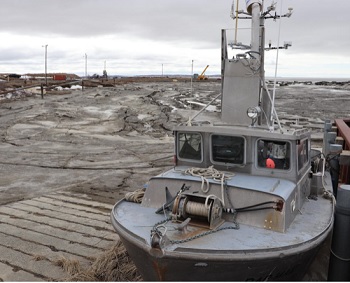
Dunleavy mandates strict guidelines for Bristol Bay commercial fishermen
The mandate targets independent fishing boats, many of which are operated by captains and crew who travel to Bristol Bay from outside Alaska. Specifically, it applies to those that have not “agreed to operate under a fleet-wide plan submitted by a company, association or entity” representing them. The new mandate also requires crewmembers to undergo verbal and physical screenings upon arrival — and they can’t have respiratory problems or fever. Crew members are allowed to quarantine onboard, though they’re still allowed to fish as long as they restrict contact with other boats and people on shore as much as possible. To protect communities, the mandate stipulates that crew can only leave the vessel for essential purposes. >click to read< 08:45
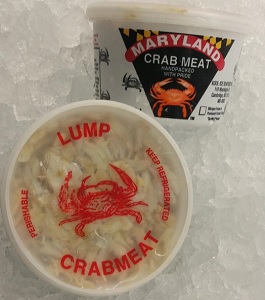
Seafood industry visa fix in question after Coronavirus outbreak
With the aid of lawmakers, seafood businesses in Maryland, Virginia, Alaska and North Carolina last month won federal approval of an additional 35,000 visas for non-immigrant workers, but the timing couldn’t have been worse. Within days, the coronavirus pandemic began shutting down businesses, including restaurants and retail outlets the seafood industry supplies. Some seafood operations let employees go, while others have hired fewer people than they would in a more typical season. Jack Brooks, president of J.M. Clayton Seafood Co. in Cambridge, Maryland, explained that the seafood industry is a seasonal business and the coronavirus has hit the hardest during the industry’s prime time. >click to read< 13:16
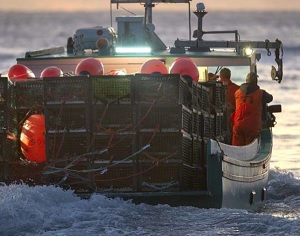
Gulf of St. Lawrence Spring lobster season begins at 6 a.m. on May 15
Fisheries and Oceans Canada says this year’s spring lobster fishery in the southern Gulf of St. Lawrence will open May 15 and close on June 30. The decision released today delays the traditional April 30 start of the season by about two weeks. The new start date covers fishing areas 23, 24 and 26A and B along the northern coasts of New Brunswick and Prince Edward Island, as well as a section of the Northumberland Strait. The season will begin at 6 a.m. on May 15 as long as weather conditions allow. >click to read< 07:34
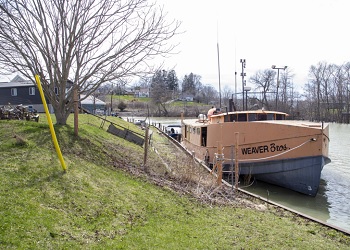
Coronavirus devastating commercial fishing industry
Lifelong commercial fisherman Mark Weaver had anticipated a bumper season for his family-run commercial fishery before the COVID-19 pandemic left the industry almost dead in the water. Now, he and the rest of Ontario’s commercial fishing industry are facing a bleak future that could leave them struggling just to survive. “I don’t know how we’re going to pay the bills,” Weaver said. While Lake Erie would normally be dotted with commercial fishing vessels at this time of year, their boats aren’t leaving the docks in Port Stanley, Wheatley and other Southwestern Ontario ports this spring since there’s nowhere to sell their catch. “It’s a total supply chain challenge and crisis that we’re in,” said Jane Graham, executive director of the Ontario Commercial Fisheries’ Association. April has been one of the “most productive fishing months of the year,” Graham said. And it looked like this April would have been just as productive, Weaver said. >click to read< 22:01

Coronavirus brings financial and physical worry for fish harvesters
“Whatever way this goes, it’s going to be a very hard year in the fishery, I think, overall,” said Jason Sullivan, a fisherman on the Avalon Peninsula. “There’s no way to sugarcoat that.” He said DFO’s release of the snow crab management plan — which saw an average quota increase of about 10 per cent — has lifted the spirits of some fish harvesters. Still, he figures others are going to have a tough decision to make this year. “If they do open the fishery, and I says ‘well, jeez I’m not going fishing, I don’t feel safe,’ the bank is going to call me and say ‘Jason, why didn’t you make your payments,'” he said. “Do you think they’re really going to care?” >click to read< 16:34
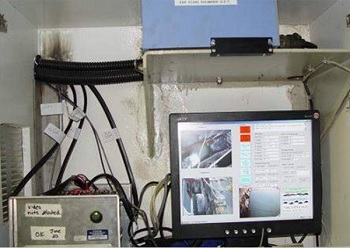
Coronavirus: DFO implements Emergency Electronic Monitoring (EM) Pilot Program to replace at-sea observers
In an April 14 fishery notice, DFO announced that the Emergency Electronic Monitoring (EM) Pilot Program was being implemented in the groundfish trawl fishery “effective immediately,” on the advice of the Groundfish Trawl Advisory Committee (GTAC). The EM pilot program will last for the duration of DFO’s April 2 Fishery Management Order suspending the at-sea observer requirement for 45 days to help protect the health of observers and fishers from the spread of the novel coronavirus. “Comprehensive, independent catch monitoring is an essential component of the groundfish trawl fishery’s management regime,” Girdler said. “In the absence of at-sea observers, EM may fulfill this need for comprehensive, independent catch monitoring on an interim basis.” >click to read< 09:13
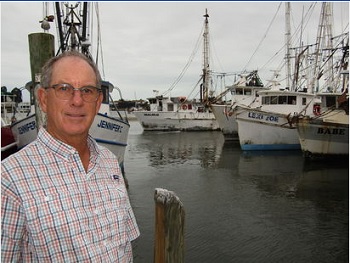
In search of aid: Congress pushing for help to local fishing industry battered by Coronavirus
In Southwest Florida, perhaps no other industry makes its mark so directly on the culture and day-to-day life of its tourism business as the fishermen who supply the seafood to local restaurants. With most of the major restaurants that serve seafood to diners closed since last month (except for those serving takeout) in response to the coronavirus, the fishing industry has taken a major hit locally.,, Erickson said the economic downturn caused by the coronavirus pandemic and subsequent shutdown measures have “hurt our market with all of these restaurants closed down because so much seafood is eaten at restaurants.” >click to read< 08:17
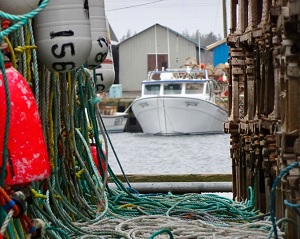
UPDATED: Spring lobster season starts May 15. 2 different start dates being recommended for 2 P.E.I. lobster fishing areas
The PEIFA released results Tuesday from its member vote held over the weekend. Members were asked whether they preferred the season start on May 6 or May 13. Voting began on Friday and wrapped up at noon on Monday. A total of 841 votes were tallied out of the eligible 954 spring lobster licence holders. The PEIFA reported results in each of the two fishing areas, LFA 24 and LFA 26A. For LFA 24, 60.9 per cent voted in favour of the May 6 start. In LFA 26A, 51.2 per cent of voting members chose the May 13 start date. >click to read< 07:29
Spring lobster season starts May – After weeks of uncertainty, Ottawa has set a date. Spring lobster fishing season starts May 15 and ends June 30.
The announcement on fishing dates in the southern Gulf of St. Lawrence, was issued Wednesday in Moncton by Fisheries and Oceans Canada. >click to read< 20:16
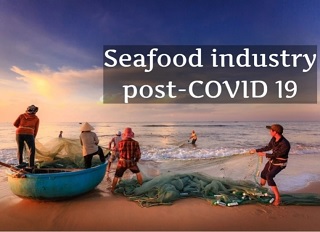
Coronavirus: Seafood industry post COVID-19, an overhaul to trigger growth of small fisheries
The coronavirus outbreak spread through the planet at an unprecedented scale and brought the whole world to a halt, plummeting demand in the majority of the sectors including the seafood industry. Seafood producers across the world are without a market for their product as demand slumps and supply chains cripple due to restrictions imposed to contain the outbreak. The seafood sector is known to have some of the most complex and repressive supply chains but the COVID-19 pandemic has highlighted the need for change that would benefit fishermen as well as consumers. >click to read< 19:01
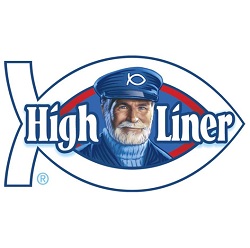
Coronavirus: High Liner Foods suspends production at New Hampshire plant
Nova Scotia-based frozen seafood producer High Liner Foods has temporarily suspended all production at its plant in Portsmouth, N.H., because of confirmed COVID-19 cases. The company will redirect some of its production to plants in Lunenburg, N.S., and Newport News, Va. In a news release, High Liner Foods said it will carry out deep cleaning, contact tracing and risk assessment in Portsmouth. “Our priority is the health and safety of our employees who are doing essential work supplying food to families across North America,” Rod Hepponstall, the company’s president and chief executive officer, said in a statement. >click to read< 12:26
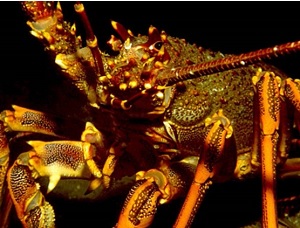
New Zealand rock lobster industry back in action with exports to China
The New Zealand lobster industry was among the first and hardest hit by Covid-19, with the export of live lobsters from New Zealand stopping in late January when China closed its restaurants and freight to the country was restricted. However, Te Anau-based Fiordland Lobster Company, which exports about 40 percent of New Zealand lobster to China, has started up again this week and its product will begin arriving in Shanghai this weekend. Lobster Exporters of New Zealand chairman Andrew Harvey confirmed lobster exports into China had resumed after “stopping dead” in late January. >click to read< 10:21
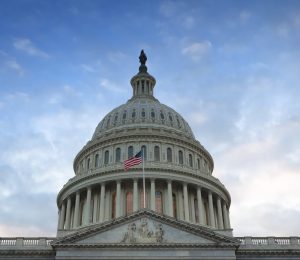
Coronavirus: Maine Fishermen still waiting to access pandemic relief funds
On March 27, Congress passed the Coronavirus Aid, Relief, and Economic Security (CARES) Act that, among other provisions, authorized one-time “economic impact payments” of $1,200 to adult U.S. residents with incomes of under $99,000 plus an additional payment of $500 for each child in a household. The CARES Act also established the Paycheck Protection Program to provide $349 billion in loans to businesses affected by the coronavirus shutdowns. Fishermen were eligible to apply for those loans as well as loans under the Economic Injury Disaster Loan program, but many did not realize that was the case. “Due to unclear guidance, many fishermen were initially told by their lenders they were not eligible for the Paycheck Protection Program,” lobster fisherman and state Rep. Genevieve McDonald (D-Stonington) said Monday. >click to read< 07:49
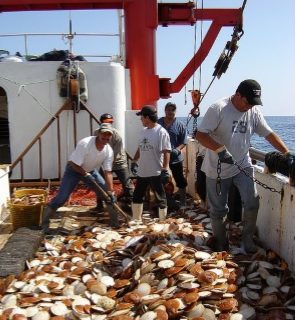
Scallops: NEFMC Approves Amendment 21 Range of Alternatives; Requests Emergency Action on Coronavirus
The New England Fishery Management Council covered several important scallop-related issues during its April 14-15, 2020 meeting, which was held by webinar. Current COVID-19 restrictions on travel and public gatherings prevented the Council from meeting in person. Here’s a recap of the scallop highlights. The Council agreed that the COVID-19 situation qualified as “unforeseen.” Over the course of its discussion, the Council did weigh the possibility of immediately initiating a framework adjustment to address the pandemic’s impacts on the scallop fishery, but the move did not garner enough support. >click to read< 14:18

































